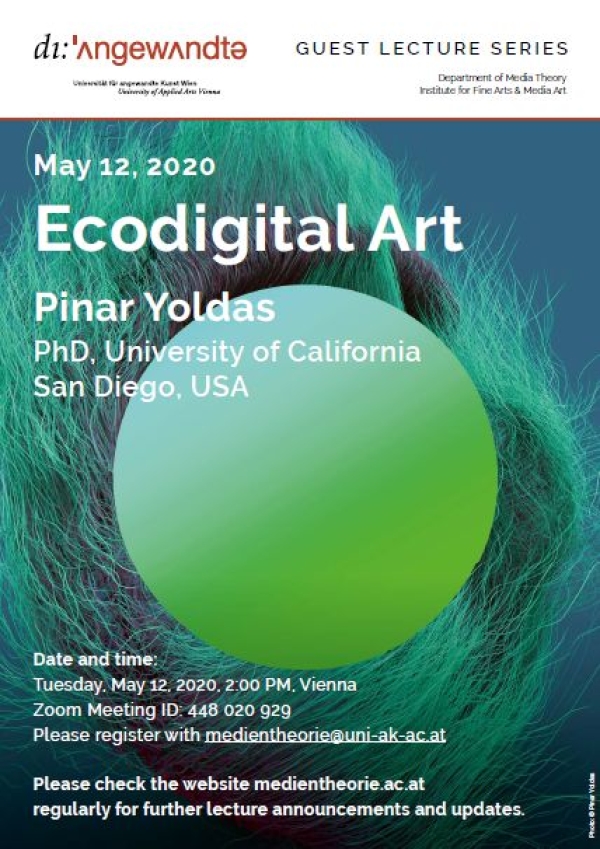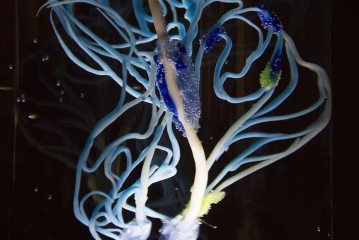Department
of Media TheoryTuesday, May 12, 2020
02:00 PM Vienna
Zoom Meeting ID: 448
020 929
The first Zoom guest lecture at the Department of Media Theory will be given during this summer term by the Turkish-American
artist Pinar Yoldas, Ph.D., who is Assistant Professor at the Department of Visual Arts, University of California San Diego,
USA.
Tuesday, May 12, 2020
02:00 PM Vienna
Zoom Meeting ID: 448 020 929
The first Zoom guest
lecture at the Department of Media Theory will be given during this summer term by the Turkish-American artist Pinar Yoldas,
Ph.D., who is Assistant Professor at the Department of Visual Arts, University of California San Diego, USA.
It will be hosted as a synchronous (real time) online lecture and is scheduled for May 12, 2020 at 2pm.The
guest lecture is organized and hosted by Professor Ingeborg Reichle within her summer term lecture series on Speculative Biologies:
New Directions in Art and Biotechnology. This guest lecture series is an informative and stimulating opportunity to hear from
distinguished artists and experts about what’s going on in the emerging fields of bioart, biodesign, and speculative biology
and it also helps our students to build their network of contacts.
Pinar Yoldas will introduce her art works
and projects since 2013, and will present her approach and reflections on the origins and historical development of the biological
arts. In her work she develops architectural installations, kinetic sculpture, sound, video, and drawing with a focus on post-humanism,
eco-nihilism, the Anthropocene, and feminist technoscience. One of her most acclaimed works so far is the project “An Ecosystem
of Excess”, which was exhibited in 2014 for the first time in a Berlin solo show. For this she created a post-human ecosystem
of speculative organisms and their imagined environment. Another project, which has attracted much attention, is her installation
“The Kitty AI: Artificial
Intelligence for Governance”, in which she created an artificial intelligence with the affective capacities of a kitten
to become the first non-human governor.
Pinar Yoldas studied architecture, visual communications,
information technology, and new media art. She received a Certificate for Cognitive Neuroscience from Duke University, USA.
There she also wrote her PhD thesis titled “Speculative Biologies: New Directions in Art in the Age of the Anthropocene”.
Her
many solo shows include The Warm, the Cool, and the Cat at Roda Sten Konsthall (2016), Polyteknikum Museum Moscow (2015),
An Ecosystem of Excess, Ernst Schering Project Space. Her group shows include ThingWorld, NAMOC National Art Museum of Beijing
(2014); Transmediale Festival, Berlin (2014), ExoEvolution at ZKM (2015),14th Istanbul Biennial (2015),Taiwan National Museum
of Fine Arts(2016). Pinar’s residencies include the MacDowell Colony, UCross Foundation, VCCA, National Evolutionary Synthesis
Center, Duke University, Quartier21 Künstlerstudio-Programm, Transmediale Villem Flusser research residency at the University
of the Arts Berlin. She has been an invited speaker at SAIC, Haus der Kulturen der Welt, Northwestern University USA, University
of Applied Arts Vienna, University of Arizona, Reed College, State University of New York at Buffalo, BacNet15, Pennsylvania
State University, and Uniiversity of California Los Angeles amongst many others. Her work has been featured in ARTE TV, Die
Welt, The Creators Project, Art21 Blog, Der Spiegel, Vogue Turkey, and Artlink BioArt issue to name a few. She holds a Ph.D.
from Duke University where she was affiliated with Duke Institute of Brain Sciences and Media Arts and Sciences. She holds
a Bachelor of Architecture from Middle East Technical University, a Master of Arts from Bilgi University, a Master of Science
from Istanbul Technical University, and a Master of Fine Arts from University of California Los Angeles where she worked at
the Art|Sci Center and the UCLA Game Lab. Her book An Ecosystem of Excess was published by ArgoBooks in 2014. Pinar was a
2015 John Simon Guggenheim Fellow in the Fine Arts and a 2016 FEAT Future Emerging Arts and Technologies Award recipient.
She holds a bronze medal in organic chemistry from the National Science Olympiad.





